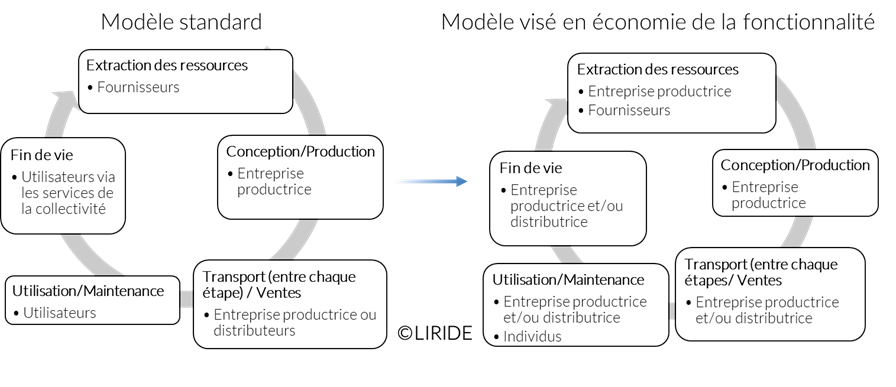Postdoctoral fellow Sylvain Cordier, under the supervision of Professor Ben Amor and with the support of research professional Léontine du Reau, has carried out a literature review of life cycle assessments (LCA) applied to the economy of functionality (EF). Discover the summary of their work.
Summary
The Functional Economy (FE) is an economic model within the circular economy paradigm. The FE consists in providing companies, individuals or territories with integrated solutions of services and products based on the sale of a performance of use or a use, and not on the simple sale of a product (standard model). It is intended to promote eco-design, optimize product use and extend product life, as well as having a positive impact on end-of-life. Its influence can be felt throughout the entire life cycle of products and services. By integrating the FE model into the entire life cycle, the entities responsible for the stages will change in relation to the standard model (see figure). Processes will then be modified in their structure (e.g.: more use and maintenance cycles, a different end-of-life, changes in distribution modes, etc.).
Life cycle assessment (LCA) is a decision-making tool that evaluates potential environmental impacts at every stage in the life cycle of a product or service. These impacts concern a number of environmental issues, such as climate change, ecosystem quality and human health. LCA makes it possible to understand, at each stage, which processes contribute most to impacts. It also enables products and services to be compared with each other, provided they have the same function.

The main objective of this project is to highlight the state of the art in LCA studies on the Functional Economy. The aim is to identify the key parameters and shortcomings of the models. Since FE is a relatively new model, LCA has rarely been applied.
In this literature review, 23 articles were deemed relevant, 3 are literature reviews, 1 is a meta-analysis, and the remainder are developments of methodological frameworks and case studies on the comparison of impacts between the sale of a product and a service.
This research brought out several findings:
According to the impact comparison case studies, the sale of a service can be favorable for certain environmental issues, compared with the purchase and ownership of a product. However, this is not always the case for all impacts.
Data collection and use are sorely lacking. Such data may concern transport, frequency of use and product lifespan, product substitution, as well as consumer preferences and changes in behavior. This involves consumer surveys, market research and many exploratory scenarios to assess potential impacts. What’s more, the sale of a service makes the seller responsible for the product used, and therefore for its end-of-life. However, few studies have detailed the modeling of product refurbishment and end-of-life. Only three case studies address this topic (Chun and Lee, 2017; Kerdlap et al., 2021; Monticelli and Costamagna, 2022).
Finally, FE can combine tangible (products) and intangible (service) elements, and therefore sub-functions that cannot be separated (Kjaer et al., 2016). For example, although a laundry service can optimize the use of washing machines, the comparison with home washing cannot be made solely on the basis of the number of washes. Indeed, a laundry service can dry clothes differently from home, and can also pack and transport them (Haapala et al., 2008). When the sale of the service includes multiple functions, the main function evaluated must be completed by a description of its sub-functions to be included in the evaluation (Kjaer et al., 2016).
This research took stock of current knowledge of the application of LCA to FE and highlighted key elements of the modelling. The aim being to improve the evaluation of Functional Economy strategies through LCA.
